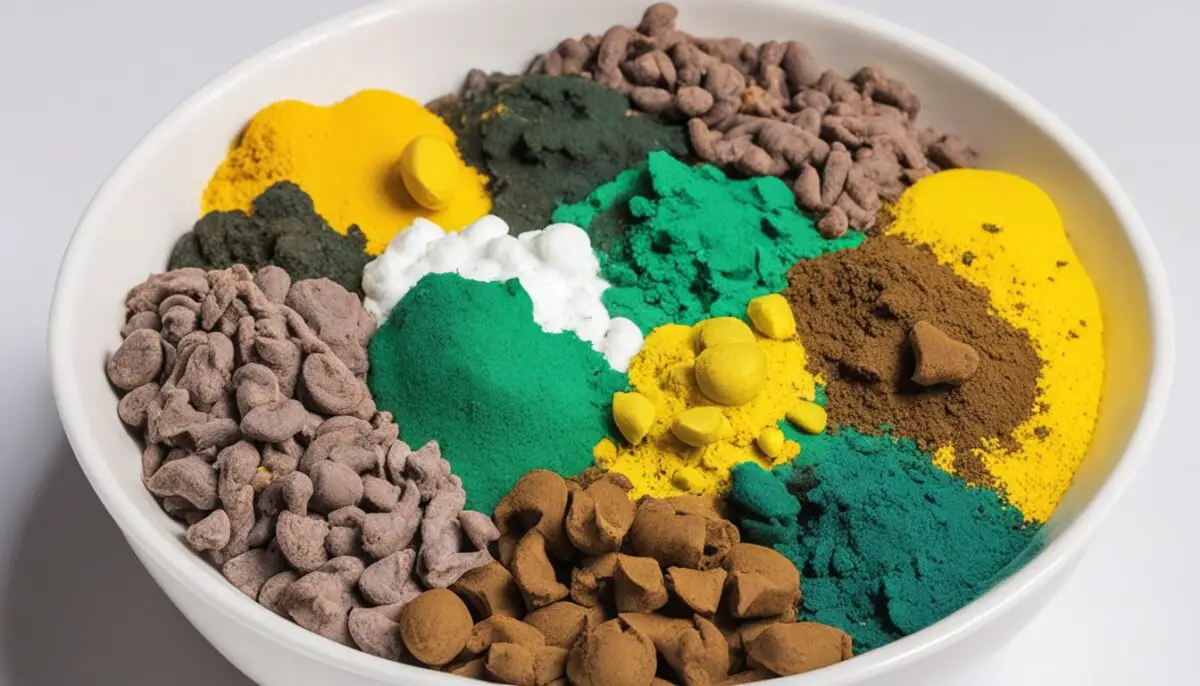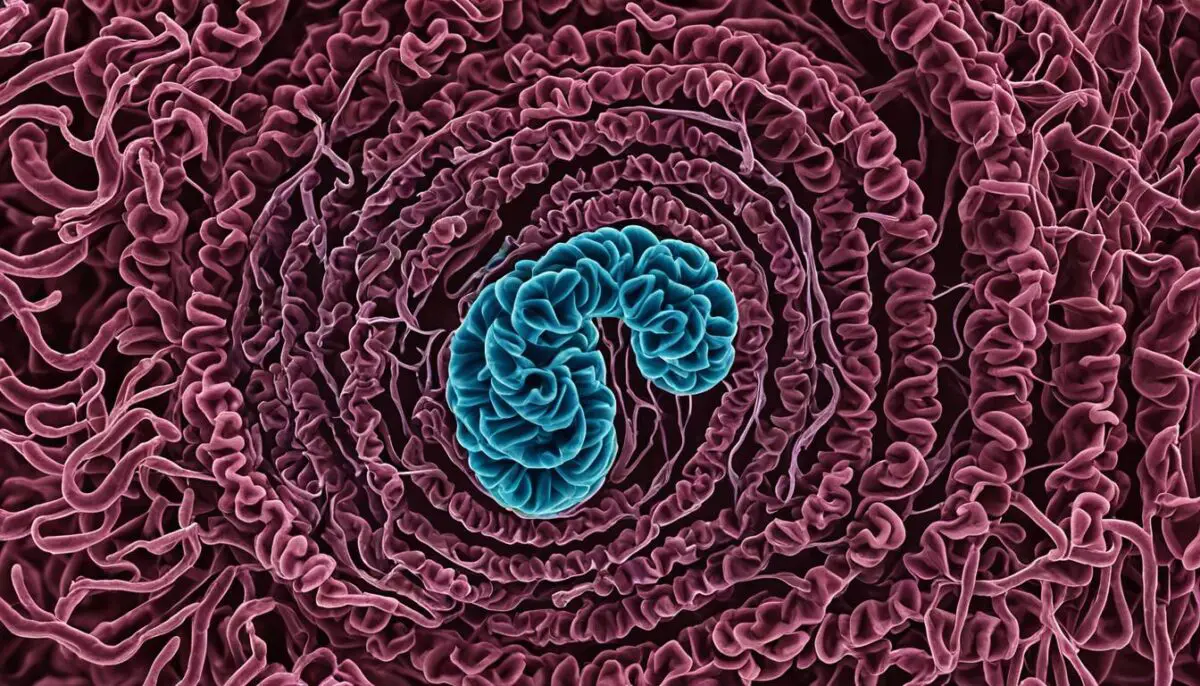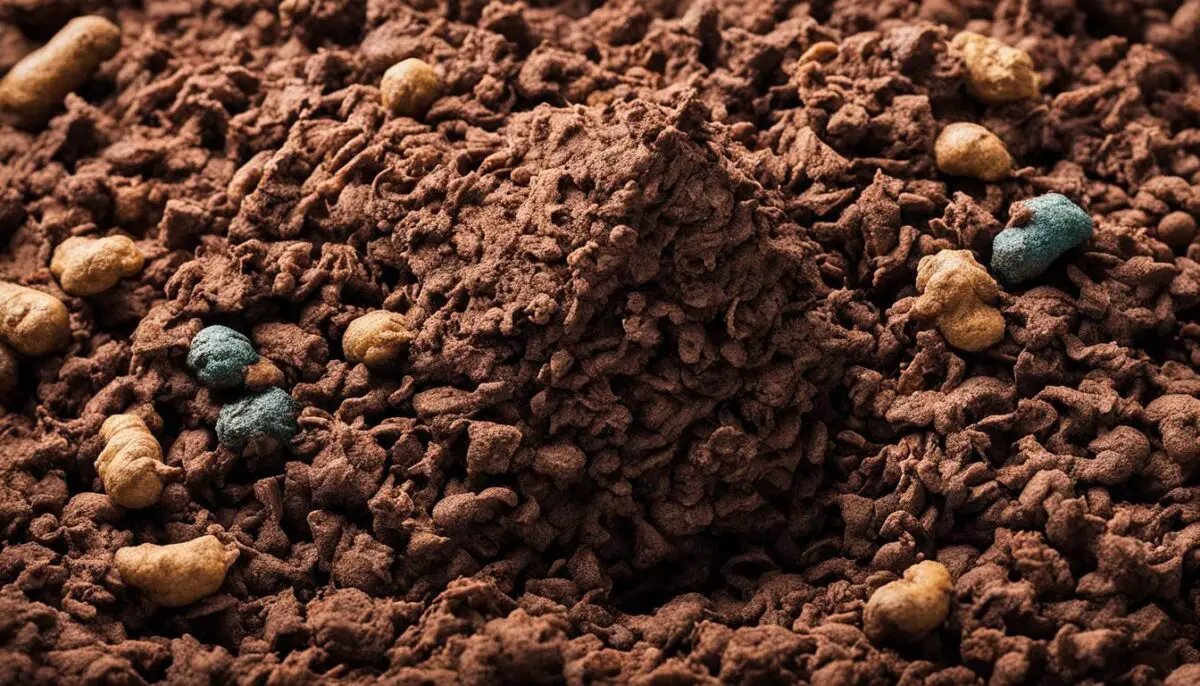Your poop can provide valuable clues about your health. Changes in bowel habits or the appearance of your poop may indicate a medical condition that requires attention. In order to identify signs of unhealthy poop, it’s important to understand what constitutes a normal bowel movement. Everyone’s poop is different, but there are some general characteristics of “normal poop” that you should be aware of.
Key Takeaways:
- Changes in bowel habits or the appearance of your poop may indicate a medical condition
- Understanding what constitutes a normal bowel movement can help identify signs of unhealthy poop
- Everyone’s poop is different, but there are general characteristics of “normal poop”
Characteristics of Healthy Poop
When it comes to your poop, there are certain characteristics that indicate a healthy digestive system. By understanding these normal poop characteristics, you can recognize any deviations that may signal an unhealthy condition. Here are the key features of healthy poop:
- Color: Healthy poop typically has a medium to dark brown color. This is a result of the digestion process and the breakdown of bilirubin, a pigment produced by the liver.
- Consistency: Healthy poop should be easy to pass and have a soft to firm consistency. It should neither be too hard nor too loose.
- Size: A normal stool size is a couple of inches in length and ideally between four and eight inches. This indicates a healthy transit time through the digestive system.
- Shape: Healthy poop usually takes the form of a long cylinder. This shape indicates that the stool is well-formed and properly compacted.
If your poop deviates significantly from these characteristics, it may be a sign of an unhealthy digestive system. Changes in color, consistency, size, or shape could indicate an underlying condition that requires attention. It’s important to pay attention to these details and consult with a healthcare professional if you have any concerns.

| Abnormal Poop Appearance | Possible Causes |
|---|---|
| Small, pellet-like stools | Constipation, lack of fiber |
| Long, skinny poops resembling pencils | Colon or rectal issues, potential signs of cancer |
| Watery or loose stools | Infection, inflammation |
| Hard, lumpy stools | Constipation, dehydration |
Poop Color Abnormalities
The color of your poop can vary depending on what you consume, but the most typical color is brown. However, there are other colors that you may see in the toilet, each indicating a potential health issue. Here are some common poop color abnormalities:
- Black poop: This can be a sign of bleeding in the upper gastrointestinal tract. It is important to consult with a healthcare professional if you notice black-colored stools.
- Green poop: Green-colored stools can be a result of your food not spending enough time in your digestive system or from consuming artificial colors. If you consistently have green poop, it’s best to discuss it with your doctor.
- Red poop: Red-colored stools may indicate bleeding in the colon. If you notice bright red or maroon-colored stools, it’s essential to seek medical attention.
- Yellow poop: Excessive fat or malabsorption can cause yellow-colored stools. If your poop consistently appears yellow, it’s recommended to consult with a healthcare professional.
- Pale or white poop: Lack of bile production can result in pale or white-colored stools. If you experience this, it’s important to discuss it with a doctor as it may indicate a problem with your liver or gallbladder.
Any significant changes in poop color should be discussed with a healthcare professional. It’s important to note that the appearance of your poop should not be the only determining factor for diagnosing health issues. Consulting with a healthcare professional is essential for proper evaluation and diagnosis.
To illustrate the different poop color abnormalities, refer to the table below:
| Poop Color Abnormality | Possible Cause |
|---|---|
| Black | Bleeding in the upper gastrointestinal tract |
| Green | Food not spending enough time in the digestive system or consuming artificial colors |
| Red | Bleeding in the colon |
| Yellow | Excessive fat or malabsorption |
| Pale or White | Lack of bile production |

Timing and Frequency of Bowel Movements
The timing and frequency of your bowel movements can provide important insights into the health of your digestive system. While the most normal time to poop is in the morning, it is also normal to have bowel movements at other times of the day.
The time it takes to have a bowel movement should be relatively quick, typically no more than 10-15 minutes. If you are spending excessive time on the toilet, it may indicate an issue with your digestive system that requires attention.
The frequency of bowel movements can vary from person to person. While some individuals may have a bowel movement once or twice a day, others may have them less frequently. The key is to understand what is normal for you. However, if you experience infrequent bowel movements or struggle with constipation, it could be a sign of an unhealthy digestive system.
On the other hand, very runny or loose stools may suggest an issue with your digestive system, such as diarrhea or malabsorption. It is important to note any significant changes in the consistency of your stools and discuss them with a healthcare professional if they persist.
Having regular, well-formed bowel movements is a good indication of a healthy digestive system. However, if you notice any signs of an unhealthy digestive system, it is recommended to seek medical advice for proper evaluation and treatment.
Common Signs of an Unhealthy Digestive System:
- Infrequent bowel movements
- Constipation or difficulty passing stool
- Diarrhea or loose stools
- Persistent abdominal pain or discomfort
- Excessive gas or bloating
- Unexplained weight loss or gain
- Changes in appetite
- Unpleasant body odor or bad breath
- Chronic heartburn or acid reflux
By paying attention to the timing, frequency, and consistency of your bowel movements, you can gain important insights into the health of your digestive system. If you identify any signs of an unhealthy digestive system, it is recommended to consult with a healthcare professional for proper diagnosis and treatment.
Remember, a healthy digestive system is essential for overall well-being, so take proactive steps to maintain optimal digestive health through a balanced diet, regular exercise, and mindful eating habits.
| Signs of an Unhealthy Digestive System | Common Causes |
|---|---|
| Infrequent bowel movements |
|
| Constipation or difficulty passing stool |
|
| Diarrhea or loose stools |
|
| Persistent abdominal pain or discomfort |
|
| Excessive gas or bloating |
|
| Unexplained weight loss or gain |
|
| Changes in appetite |
|
| Unpleasant body odor or bad breath |
|
| Chronic heartburn or acid reflux |
|

What Poop Smell Says About Your Health
While it is normal for poop to have an unpleasant odor, excessively foul-smelling feces can indicate an infection or a stomach bug. It can also be a sign of an inability to process certain nutrients. If you notice that your poop smells particularly bad after consuming certain foods, it is worth discussing with a doctor, especially if accompanied by unexplained weight loss.
Having a strong, unpleasant smell in your stool could be a symptom of an underlying health issue. It’s important to pay attention to any changes in the odor of your poop, as it can be a valuable indicator of your digestive system’s health. If you consistently notice a persistent and unusually foul smell, it may be a sign that something is amiss.
Common Causes of Foul-Smelling Stool:
- Food intolerances or sensitivities.
- Infections in the gastrointestinal tract.
- Malabsorption of nutrients.
- Changes in gut bacteria.
- Digestive disorders such as Crohn’s disease or celiac disease.
If you experience foul-smelling stool accompanied by other symptoms like abdominal pain, frequent diarrhea, or blood in your stool, it is important to seek medical attention. A healthcare professional will be able to evaluate your symptoms, diagnose any underlying conditions, and recommend appropriate treatment.
“The smell of your poop can provide valuable insights into your digestive health. Don’t ignore any strong, persistent odors and be sure to consult a healthcare professional if you have concerns.”
Remember, a temporary change in the odor of your poop is usually nothing to worry about, as it can be influenced by the foods you eat. However, if you consistently notice a foul smell that lingers, it may be worth investigating further to ensure optimal digestive health.
Next, let’s explore another important aspect of analyzing your poop: whether it sinks or floats and what it can mean for your health.

Sink or Float: What It Means for Your Health
Have you ever wondered why some poop floats while others sink? The buoyancy of your stools can actually provide valuable insights into your digestive health. While most poop sinks, it is not uncommon for it to float on the surface of the water.
When it comes to floating poop, there can be a few possible explanations. One reason is the presence of gas in your digestive system. Excess gas can make your poop less dense, causing it to float. This is often related to a high-fiber diet or the consumption of certain foods that are known to produce gas, such as beans or broccoli.
On the other hand, floating poop can also be the result of improper food processing or an underlying digestive disorder. If your floating stools are accompanied by a strong odor or other persistent digestive symptoms, it’s important to consult with a healthcare professional to rule out any potential issues.
But floating poop is not the only factor to consider when evaluating your bowel movements. The consistency of your stools can provide further clues about your digestive health. For example, loose or watery stools may indicate a condition such as diarrhea or malabsorption, while hard, dry stools can be a sign of constipation or dehydration. It’s essential to pay attention to any changes in consistency and discuss them with a doctor if they persist.
To better understand the importance of sink or float, let’s take a look at a visual representation:
| Poop Characteristics | Meaning for Your Health |
|---|---|
| Sinking poop | Normal and typically indicates a well-functioning digestive system. |
| Floating poop | May be caused by excess gas or improper food processing. Consult with a healthcare professional if accompanied by strong odor or persistent symptoms. |
By paying attention to the sink or float of your stool and understanding the potential implications, you can gain valuable insights into your digestive health. Remember that any significant changes or persistent abnormalities should be discussed with a healthcare professional to ensure proper evaluation and necessary treatment.
Conclusion
Keeping an eye on the characteristics of your poop can provide valuable insights into your overall health and the functioning of your digestive system. By recognizing the signs of unhealthy poop, you can take proactive steps towards maintaining a healthier digestive system.
If you notice any significant changes in the appearance, color, smell, or consistency of your poop, it is important to consult with a healthcare professional. They can help determine the underlying cause and provide appropriate treatment if necessary.
To promote a healthier digestive system, there are several tips you can follow. First, ensure that you are consuming a balanced diet with plenty of fiber-rich foods, such as fruits, vegetables, and whole grains. Hydration is also key, so remember to drink enough water throughout the day. Regular exercise can aid digestion, so incorporate physical activity into your routine. Lastly, manage stress levels as high stress can negatively impact your digestive system.
By taking these steps and being proactive about the signs of unhealthy poop, you can improve your overall well-being and maintain a healthier digestive system.
FAQ
What does unhealthy poop look like?
Unhealthy poop may have small, pellet-like stools or long, skinny poops resembling pencils. It may also have an abnormal shape or consistency.
How can I recognize unhealthy feces?
Look for changes in the appearance, shape, color, and smell of your poop. Any significant deviation from normal characteristics may indicate an unhealthy digestive system.
What are the signs of abnormal poop appearance?
Signs of abnormal poop appearance include small, pellet-like stools or long, skinny poops resembling pencils. Changes in shape or consistency may also indicate an issue with your digestive system.
What do poop color and consistency abnormalities indicate?
Abnormal poop color can indicate various health issues. Black poop may suggest bleeding in the upper gastrointestinal tract, green poop may result from food passing too quickly through your system or consuming artificial colors, red poop may indicate bleeding in the colon, and yellow or white poop could imply malabsorption. Changes in consistency can also provide insights into digestive health.
How do the timing and frequency of bowel movements affect your digestive system?
The timing and frequency of bowel movements can vary, but excessive hardness or extreme runniness may indicate issues with your digestive system.
What does the smell of poop say about your health?
While it is normal for poop to have an unpleasant odor, excessively foul-smelling feces may indicate an infection, a stomach bug, an inability to process certain nutrients, or an underlying digestive disorder.
What does it mean if my poop floats or sinks?
Most poop sinks, but it is not uncommon for it to float. Floating poop can be caused by certain foods or excess gas in the digestive system. However, if the stools float and have a strong odor, it may indicate improper food processing or an underlying digestive disorder.
What are some tips for a healthier digestive system?
To maintain a healthier digestive system, pay attention to the appearance, color, smell, consistency, timing, and frequency of your poop. If you notice any significant changes or abnormalities, it is recommended to consult with a healthcare professional to determine the underlying cause and seek appropriate treatment if necessary.

